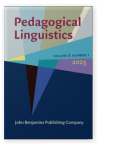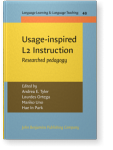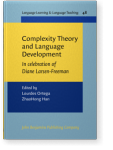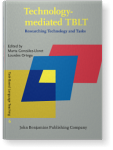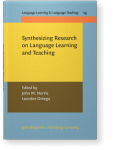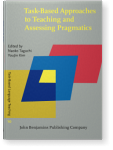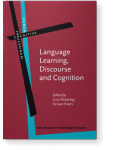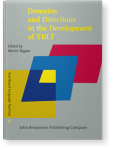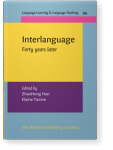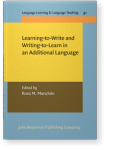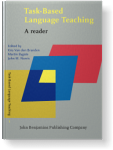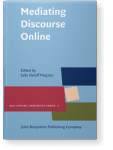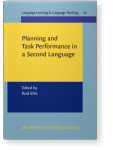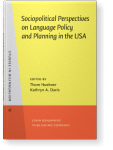Lourdes Ortega
List of John Benjamins publications for which Lourdes Ortega plays a role.
Journal
Usage-inspired L2 Instruction: Researched pedagogy
Edited by Andrea E. Tyler, Lourdes Ortega, Mariko Uno and Hae In Park
[Language Learning & Language Teaching, 49] 2018. xvii, 324 pp.
Subjects Applied linguistics | Language acquisition | Language teaching | Multilingualism
Complexity Theory and Language Development: In celebration of Diane Larsen-Freeman
Edited by Lourdes Ortega and ZhaoHong Han
[Language Learning & Language Teaching, 48] 2017. xv, 234 pp.
Subjects Cognition and language | Language acquisition | Psycholinguistics | Theoretical linguistics
Technology-mediated TBLT: Researching Technology and Tasks
Edited by Marta González-Lloret and Lourdes Ortega
[Task-Based Language Teaching, 6] 2014. vi, 336 pp.
Subjects Applied linguistics | Language acquisition | Language teaching
Synthesizing Research on Language Learning and Teaching
Edited by John M. Norris and Lourdes Ortega
[Language Learning & Language Teaching, 13] 2006. xiv, 349 pp.
Subjects Applied linguistics | Language acquisition | Language teaching
2018 Chapter 8. Pragmatics, tasks, and technology: A synergy Task-Based Approaches to Teaching and Assessing Pragmatics, Taguchi, Naoko and YouJin Kim (eds.), pp. 191–214 | Chapter
This chapter explores the relationship among pragmatics, tasks, and technology when the goal is to support the development of pragmatics in a new language (L2). We view L2 pragmatic competence as culturally and situationally specific and inseparable from authentic communication, which encompasses… read more
2018 Chapter 9. What is happened? Your amazon.com order has shipped: Overpassivization and unaccusativity as L2 construction learning Language Learning, Discourse and Cognition: Studies in the tradition of Andrea Tyler, Pickering, Lucy and Vyvyan Evans (eds.), pp. 213–247 | Chapter
It is well known that many L2 users overpassivize unaccusatives. The same L2 users may also be reluctant to accept constructions with unaccusative meanings. We examined the responses from 56 L2 users of English on a scaled grammaticality judgment task. We predicted that performance would be… read more
2018 Chapter 14. Usage-inspired L2 instruction: Some reflections and a heuristic Usage-inspired L2 Instruction: Researched pedagogy, Tyler, Andrea E., Lourdes Ortega, Mariko Uno and Hae In Park (eds.), pp. 315–321 | Chapter
The work gathered in this collection suggests that usage-inspired second language (L2) instruction is beginning to take hold in instructed second language acquisition (SLA) and has a bright future as a researched pedagogy in support of adult L2 learning and multilingualism. In this closing chapter,… read more
2018 Chapter 1. Usage-inspired L2 instruction: An emergent, researched pedagogy Usage-inspired L2 Instruction: Researched pedagogy, Tyler, Andrea E., Lourdes Ortega, Mariko Uno and Hae In Park (eds.), pp. 3–26 | Chapter
A new ethos for second language (L2) instruction is offered in this volume, one that gathers key instructed second language acquisition (SLA) scholars around usage-based perspectives grounded in over twenty years of exciting discoveries in psychology, psycholinguistics, cognitive science,… read more
2017 Introduction Complexity Theory and Language Development: In celebration of Diane Larsen-Freeman, Ortega, Lourdes and ZhaoHong Han (eds.), pp. 1–10 | Chapter
2015 Staking out the territory of technology-mediated TBLT Domains and Directions in the Development of TBLT: A decade of plenaries from the international conference, Bygate, Martin (ed.), pp. 59–86 | Article
In this chapter we survey areas of current interest in the use of technology for taskbased language teaching (TBLT) purposes and identify promising directions for pedagogy and research. We begin by reviewing the two vibrant topics of interaction and cognitive task complexity. We conclude that… read more
2014 Chapter 1. Towards technology-mediated TBLT: An introduction Technology-mediated TBLT: Researching Technology and Tasks, González-Lloret, Marta and Lourdes Ortega (eds.), pp. 1–22 | Article
Computer and online-communication technologies have given rise to new tasks in the real world. The present collection* is based on two premises: (a) that rapid digital technological change fuels constant transformations in learning and language use, continually creating new language education… read more
2014 Chapter 8. Trying out theories on interlanguage: Description and explanation over 40 years of L2 negation research Interlanguage: Forty years later, Han, ZhaoHong and Elaine Tarone (eds.), pp. 173–202 | Chapter
This chapter examines the development of English negation through the diverse theoretical lenses that have been applied to this phenomenon over 40 years of interlanguage research. Depending on the theory, L2 learners are imagined to have different learning tasks: from traversing negation stages or… read more
2011 Chapter 11. Reflections on the learning-to-write and writing-to-learn dimensions of second language writing Learning-to-Write and Writing-to-Learn in an Additional Language, Manchón, Rosa M. (ed.), pp. 237–250 | Article
This final chapter explores main themes in the book and offers readers some critical points to ponder. I first highlight the intellectual and disciplinary influences which converge into the three dimensions that motivate the book – learning to write (LW) and writing to learn content (WLC) or… read more
2009 Chapter 14. What do learners plan? Learner-driven attention to form during pre-task planning Task-Based Language Teaching: A reader, Van den Branden, Kris, Martin Bygate and John M. Norris (eds.), pp. 301–332 | Article
2008 Online interactions and L2 Learning: Some ethical challenges for L2 researchers Mediating Discourse Online, Magnan Pierce, Sally (ed.), pp. 331–355 | Article
2006 1. The value and practice of research synthesis for language learning and teaching Synthesizing Research on Language Learning and Teaching, Norris, John M. and Lourdes Ortega (eds.), pp. 3–50 | Chapter
2005 3. What do learners plan? Learner-driven attention to form during pre-task planning Planning and Task Performance in a Second Language, Ellis, Rod (ed.), pp. 77–109 | Chapter
1999 Language and Equality: Ideological and Structural Constraints in Foreign Language Education in the U.S. Sociopolitical Perspectives on Language Policy and Planning in the USA, Huebner, Thom and Kathryn A. Davis (eds.), pp. 243–266 | Article
